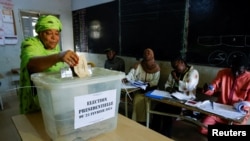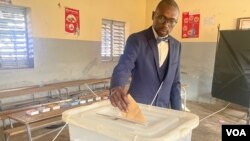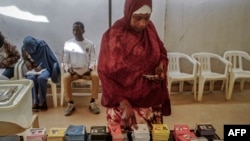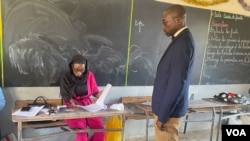People in Senegal waited Monday for results of the country’s presidential election, after voters went to the polls Sunday to choose a successor to outgoing President Macky Sall.
The vote was largely peaceful, after being delayed for a month amid Sall’s attempt to push the election to the end of the year.
There were 19 candidates vying for the presidency, with an absolute majority needed to win the election in the first round. Some 7.3 million people were eligible to vote in the nation of 17 million.
Election day was one many had been waiting for, including Jules Rolland Pascal Diatta. He was the first to cast his ballot in voting room number seven at a school about 30 minutes outside Dakar’s city center. He arrived two and half hours before the poll officially opened.
“I see that they are actually on time and open at 8 a.m. sharp. This is a very important election for me and everyone here. I like my candidate because he has a solid and well-defined program that I think could save Senegal,” he said.
He says he voted for the coalition led by Bassirou Diomaye Faye.
Faye, a former tax inspector, is backed by Ousmane Sonko — who was seen as the key challenger to Sall. Sonko was barred from running in this year’s elections over a previous defamation conviction. Both Faye and Sonko were recently released from prison.
Another voter, Ahmadou Khadim Lo, said he hopes for job creation to be the number one goal for the next leader.
“Seventy-five percent of the Senegalese population is young and many of them have diplomas but can’t find jobs,” he said.
The sentiment echoed by Khady Diagne who spoke to VOA before casting her vote.
“Living conditions are difficult here. The health care system is poor, there are no jobs, I could spend an entire year telling you about all the problems our country has,” she said.
Seynabou Faye told VOA she wants a continuation of the policies of the current regime.
“I just love Macky Sall. He’s done more work than any other president before him. He’s built bridges, the Bus Rapid Transit system, stadiums, roads. I would like to see Amadou Ba win so he can work on some of Sall’s unfinished projects,” said Faye.
Ndoumbe Gueye, the head of voting room No. 7 at the polling station in the neighborhood of Scat Urbam, exp[lained the process.
“Once a voter comes in, he or she shows me their national identification card first," she said. "My team verifies that the person is registered, and this is the right place for them to vote. Then they can pick five out of the 19 candidates, pick up an envelope, and proceed to the voting booth. Their final choice can be inserted into the envelope and submitted. Once that’s done, they come back to us and dip their small finger in ink [to show they’ve voted].”
Observers from many organizations were also present, including some from the European Union which sent 100 observers all over the country. Malin Bjork, who heads the group that arrived in early January, held a news conference Sunday morning.
“What we’ve been able to observe is that the polling started on time with sometimes long lines, which shows that people are motivated and interested in voting. The material was in place and the rules were followed by all voting centers,” said Bjork.
Senegal has always been seen as a stable democracy in a region plagued by coups, until recently when President Sall tried unsuccessfully to postpone the election by 10 months. While Sall said he would not seek a third term, his critics accused him of wanting to hold on to power.








